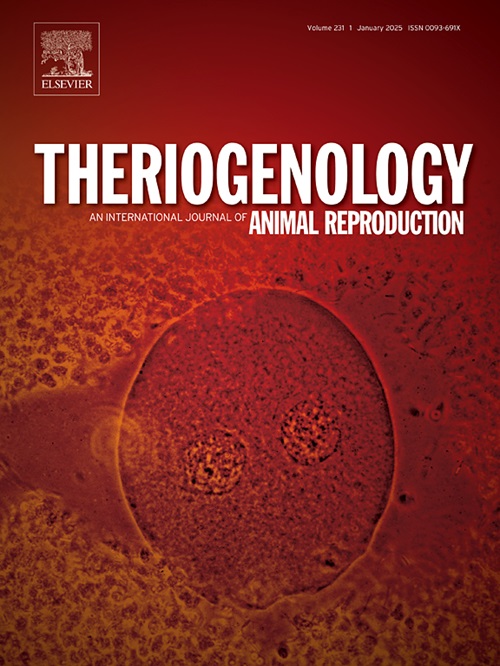Associations between immunological and hormonal parameters during healthy pregnancy in mares
IF 2.5
2区 农林科学
Q3 REPRODUCTIVE BIOLOGY
引用次数: 0
Abstract
Associations between the immune and endocrine systems during equine pregnancy remain poorly understood. Based on the hypothesis that distinct phases of the equine healthy gestation are characterized by specific associations between circulating immunological and hormonal parameters, contributing to pregnancy maintenance, this investigation aimed to: (i) evaluate how circulating immunological and hormonal parameters change across different phases of pregnancy; (ii) investigate associations between changes in circulating immunological and hormonal parameters; and (iii) propose potential hormonal drivers of immunological modulation during pregnancy. Peripheral blood samples were prospectively collected from mares (n = 8) before ovulation and during pregnancy at 30, 90, 150, 210, 240, 270, 300, and 330 days of their healthy gestations. An immunological panel included the distribution of circulating T cell (CD3, CD4, and CD8) and B cell subpopulations, complete blood counts (CBC), and serum protein profile. Hormonal analyses included equine chorionic gonadotropin (eCG), progestogens, androgens, estrogens, corticosteroids, and thyroid hormones. At 90 days, a statistically significant increase in peripheral blood CD4 T cell distribution was accompanied by a concomitant reduction in B cell distribution. This immunological modulation correlated positively with eCG, progesterone (P4), 5α-dihydroprogesterone (DHP), and estrone sulfate, and inversely with B cell levels. In contrast, at 210 days, B cell distribution peaked significantly while CD4 T cell distribution declined, concomitant with a rise in albumin levels. These changes positively correlated with cortisone and hematocrit. Mid-gestation was characterized by associations between different androgens and circulating T cell and B cell distributions. Consistent negative associations were observed between progesterone, DHP, and estradiol-17β with glucocorticoid metabolites throughout gestation. Estradiol-17β and IgM concentrations showed a positive correlation in late gestation. Immune-hormone and hormone-hormone associations were more pronounced during early and mid-gestation, while the final 100 days of pregnancy were characterized by relatively constant levels. Collectively, our findings suggest immune-hormone associations that potentially orchestrate immunomodulation, fetal development, successful pregnancy maintenance, and parturition in the mare.
母马健康妊娠期间免疫和激素参数的关系
马怀孕期间免疫系统和内分泌系统之间的关系仍然知之甚少。基于马健康妊娠的不同阶段以循环免疫和激素参数之间的特定关联为特征,有助于维持妊娠的假设,本研究旨在:(i)评估循环免疫和激素参数在妊娠不同阶段的变化;(ii)研究循环免疫和激素参数变化之间的关系;(iii)提出怀孕期间免疫调节的潜在激素驱动因素。在母马健康妊娠的30、90、150、210、240、270、300和330天,前瞻性地采集母马(n = 8)排卵前和妊娠期间的外周血。免疫小组包括循环T细胞(CD3, CD4和CD8)和B细胞亚群的分布,全血细胞计数(CBC)和血清蛋白谱。激素分析包括马绒毛膜促性腺激素(eCG)、孕激素、雄激素、雌激素、皮质类固醇和甲状腺激素。在第90天,外周血CD4 T细胞分布的统计学显著增加伴随着B细胞分布的减少。这种免疫调节与eCG、孕酮(P4)、5α-二氢孕酮(DHP)和硫酸雌酮呈正相关,与B细胞水平呈负相关。相比之下,在210天,B细胞分布明显达到峰值,而CD4 T细胞分布下降,同时白蛋白水平上升。这些变化与可的松和红细胞压积呈正相关。妊娠中期的特点是不同的雄激素和循环T细胞和B细胞分布之间的关联。在整个妊娠期间,黄体酮、DHP和雌二醇-17β与糖皮质激素代谢物呈一致的负相关。雌二醇-17β与IgM浓度在妊娠后期呈正相关。免疫激素和激素-激素的关联在妊娠早期和中期更为明显,而妊娠最后100天的特征是相对稳定的水平。总的来说,我们的研究结果表明,免疫激素的关联可能会协调免疫调节、胎儿发育、成功妊娠维持和母马分娩。
本文章由计算机程序翻译,如有差异,请以英文原文为准。
求助全文
约1分钟内获得全文
求助全文
来源期刊

Theriogenology
农林科学-生殖生物学
CiteScore
5.50
自引率
14.30%
发文量
387
审稿时长
72 days
期刊介绍:
Theriogenology provides an international forum for researchers, clinicians, and industry professionals in animal reproductive biology. This acclaimed journal publishes articles on a wide range of topics in reproductive and developmental biology, of domestic mammal, avian, and aquatic species as well as wild species which are the object of veterinary care in research or conservation programs.
 求助内容:
求助内容: 应助结果提醒方式:
应助结果提醒方式:


